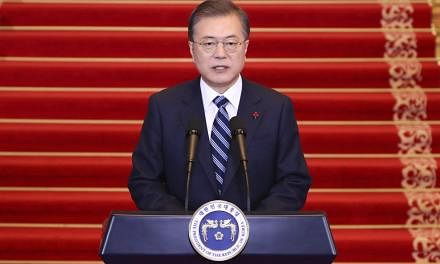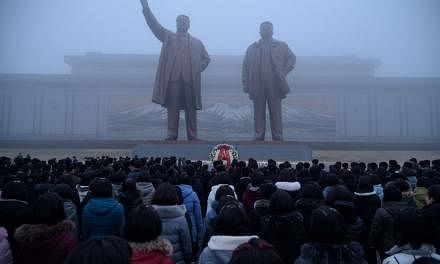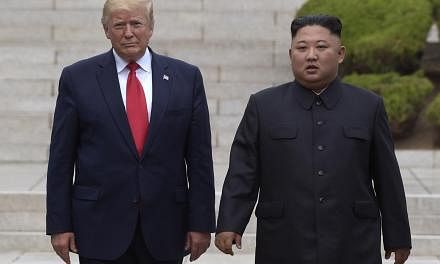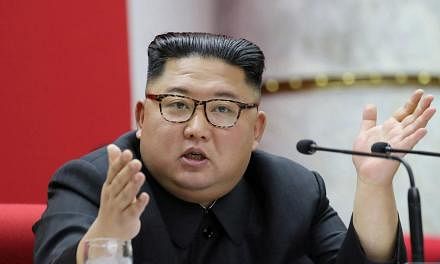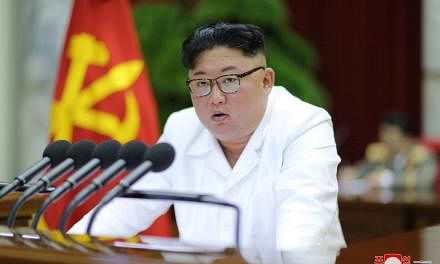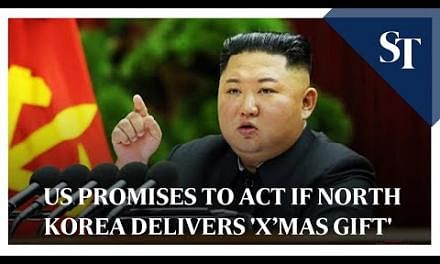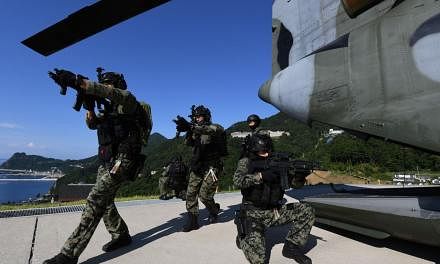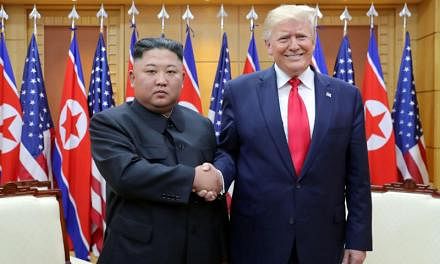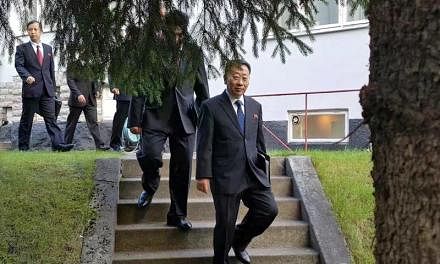WASHINGTON (BLOOMBERG) - A historic summit between US President Donald Trump and North Korean leader Kim Jong Un - abruptly agreed to with little plan for how events would unfold - collapsed as the leaders talked past each other on their goals, phone calls weren't returned and rhetoric turned from hopeful to sour.
US officials insist they're optimistic the meeting will happen, eventually. And North Korea's Vice Foreign Minister Kim Kye Gwan said on Friday (May 25) that his country remains willing to meet the US any time.
But the failure to deliver the much-advertised summit set for June 12 in Singapore is a bitter lesson for the Trump administration.
US officials insist North Korea is responsible for the breakdown. Negotiators from Pyongyang failed to show up at a preparatory meeting in Singapore, according to a senior administration official, while efforts to coordinate plans over the phone brought only "dial tones", Secretary of State Mike Pompeo said.
For weeks, Trump administration officials also struggled to articulate what they hoped the meeting would achieve.
They said simply that it would provide momentum toward "CVID" - complete, verifiable, irreversible denuclearisation of North Korea - only after which sanctions relief would follow.
Now without the prospect of talks to unite them, it's not clear whether other countries - particularly China - will agree to keep up the sanctions campaign that probably pressured North Korea into offering the meeting in the first place.
President Trump signalled concern that the sanctions regime may already be weakening when he said on Twitter on May 21 that he heard the border between China and North Korea "has become much more porous". That may worsen over time.
The stalled bid to denuclearise the Korean peninsula has alienated US ally South Korea and probably given North Korea and China the upper hand diplomatically.
"This cancellation is more a reflection of the disarray within the administration than it is a reflection of the North Korean position," Ms Suzanne DiMaggio, director of the Iran Initiative at the New America Foundation, said in a phone interview.
The US goal of total denuclearisation would have been a tall order for a first-ever meeting between the leaders of the US and North Korea after decades of recriminations and mistrust.
But US officials insisted that the rapid dismantling of Pyongyang's weapons programme was a prerequisite to any economic opening.
North Korea's repeated insistence that it would agree to no such thing - and that it wasn't interested in US investment - never seemed to matter all that much to the Trump team. As the summit date loomed, it became clear the two sides had no shared vision.
The immediate reason for Mr Trump's decision to scrub the summit was what the President, in a letter to Mr Kim on Thursday, called "tremendous anger and open hostility" from North Korea after it fired rhetorical barbs at Vice-President Mike Pence and National Security Adviser John Bolton.
After the news broke, other reasons for the American decision to cancel began to emerge.
Appearing before the Senate Foreign Relations Committee, Mr Pompeo said US teams had heard "dial tones" in recent days when they tried to contact North Korean counterparts to prepare for the summit.
"Over the past many days, we have endeavoured to do what Chairman Kim and I had agreed - to put teams, preparation teams, together to begin to work to prepare for the summit," Mr Pompeo said. "And we had received no response to our inquiries from them."
Now that the summit is cancelled, Mr Trump's surprise move in March to accept it shows the dangers of straying from a more deliberate, and traditional, approach built on an analysis of what North Korea sought from the meeting and what the US might get out of it.
Usually, those critical details are ironed out by teams of negotiators before any head of state meeting is announced.
European allies, stung by Mr Trump's recent decision to withdraw from the Iran nuclear deal, may be non-plussed by the inconsistencies in Mr Trump's letter to Mr Kim.
While condemning North Korea's hostile statements, Mr Trump wrote that he felt "a wonderful dialogue was building up between you and me" and urged the North Korean leader not to hesitate to call or write.
"Bizarre letter from the White House to cancel North Korea Summit," Dr Wolfgang Ischinger, a former German diplomat and chairman of the Munich Security Conference, wrote in a tweet.
"This letter will surely be studied in diplomatic academies everywhere - as an example of really bad letter-writing."
Most damaging, according to some analysts, is that the US left its key ally in the crisis, South Korea, scrambling.
Officials in Seoul seemed unsure yet again whether Mr Trump was being erratic or intentionally unpredictable, with a government spokesman initially saying they were trying to understand the US leader's intentions in cancelling the summit.
"It's very regrettable that the June 12 summit won't take place," South Korean President Moon Jae In said in a statement after holding an emergency meeting with his advisers.
"Denuclearisation and lasting peace of the Korean Peninsula are a historic assignment that can't be abandoned or delayed."
Optimism that the two sides could reach a deal quickly began to fade last week when North Korea issued a statement threatening to pull out of the summit and criticising Mr Bolton.
North Korea cited comments Mr Bolton made on Fox News when he suggested the negotiations could follow the "Libya model", in which Muammar Gaddafi gave up his nuclear weapons in exchange for sanctions relief.
Years later, Gaddafi was overthrown by his own people and suffered a gruesome death.
Administration officials had been hopeful that North Korea was genuinely ready for a change, and Mr Bolton made no more public appearances.
But the damage had been done, and the tit-for-tat insults came with speed.
There may still be some longer-term benefit to the failed effort, according to Dr Victor Cha, a senior adviser and Korea chair at the Centre for Strategic and International Studies in Washington.
The US now has much more robust diplomatic channels with the North Koreans, worked out over the course of planning for the meeting.
And Mr Pompeo, after two visits to Pyongyang, has a nascent relationship with Mr Kim.
It's a connection to a North Korean leader that no US administration had managed so early in its tenure.
"If what this postponement leads to is the continuation of a dialogue and a pre-negotiation to do something later, then we are not that much worse off," Mr Cha said.
"The glass-half-empty is the North Koreans take this as a cue to end their moratorium and start testing ballistic missiles again."

